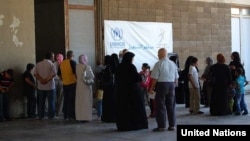GENEVA —
The U.N. refugee agency is expanding registration and assistance for the thousands of Syrians fleeing daily into neighboring countries.
At a Tuesday press conference in Geneva, the UNHCR warned it won't be able to maintain the ambitious program for too long without increased funding from the international community.
One month ago, the United Nations appealed for $1.1 billion to aid Syrian refugees this year. The UNHCR says it has received only 18 percent of what it needs to provide assistance to the growing numbers of vulnerable refugees in the region.
Staff in Lebanon is registering, on average, 1,500 refugees a day and is increasing its ability to respond to the growing needs, according to the UN refugee agency.
Aid workers in Jordan began an accelerated registration program in the capital, Amman on Tuesday.
The aim is to process up to 1,400 Syrian refugees a day, a number which will increase once the registration center in Irbid, in northern Jordan, begins to operate.
“Za’atri camp has experienced a huge increase in arrival numbers with 8,821 Syrian refugees crossing the border in the past five days," UNHCR spokesman Adrian Edwards said. "Refugees have been arriving throughout the night and into the day marking something of a change from the previous arrival patterns. Over 21,000 refugees have crossed into Jordan since the start of this month. New arrivals reporting increasing desperation in their search for safety.”
About 7,700 refugee families in Jordan are benefiting from cash support, according to Edwards. That's 60 percent more than in November. But, because of a money shortfall, he says the UNHCR is unable to assist all 8,523 families that are supposed to receive cash assistance this month.
He notes 80 percent of Syrian refugees are living in urban areas, so cash aid is a boon for them. He says it allows the most vulnerable households to cover their basic needs, such as rental costs.
Of the more than 73,000 Syrian refugees now registered in Iraq, Edwards says more than half are living in refugee camps, with 35 percent living in urban areas. Women and children make up more than half of the Syrian refugee population.
Edwards says the Turkish government is currently hosting more than 156,800 refugees in 15 camps in seven provinces.
A UNHCR analysis of data for over 278,000 Syrian refugees registered in Jordan, Lebanon, Iraq and Egypt shows more than half are children. It finds one in five households is headed by females, and close to 90 percent of the refugees arrived last year.
At a Tuesday press conference in Geneva, the UNHCR warned it won't be able to maintain the ambitious program for too long without increased funding from the international community.
One month ago, the United Nations appealed for $1.1 billion to aid Syrian refugees this year. The UNHCR says it has received only 18 percent of what it needs to provide assistance to the growing numbers of vulnerable refugees in the region.
Staff in Lebanon is registering, on average, 1,500 refugees a day and is increasing its ability to respond to the growing needs, according to the UN refugee agency.
Aid workers in Jordan began an accelerated registration program in the capital, Amman on Tuesday.
The aim is to process up to 1,400 Syrian refugees a day, a number which will increase once the registration center in Irbid, in northern Jordan, begins to operate.
“Za’atri camp has experienced a huge increase in arrival numbers with 8,821 Syrian refugees crossing the border in the past five days," UNHCR spokesman Adrian Edwards said. "Refugees have been arriving throughout the night and into the day marking something of a change from the previous arrival patterns. Over 21,000 refugees have crossed into Jordan since the start of this month. New arrivals reporting increasing desperation in their search for safety.”
About 7,700 refugee families in Jordan are benefiting from cash support, according to Edwards. That's 60 percent more than in November. But, because of a money shortfall, he says the UNHCR is unable to assist all 8,523 families that are supposed to receive cash assistance this month.
He notes 80 percent of Syrian refugees are living in urban areas, so cash aid is a boon for them. He says it allows the most vulnerable households to cover their basic needs, such as rental costs.
Of the more than 73,000 Syrian refugees now registered in Iraq, Edwards says more than half are living in refugee camps, with 35 percent living in urban areas. Women and children make up more than half of the Syrian refugee population.
Edwards says the Turkish government is currently hosting more than 156,800 refugees in 15 camps in seven provinces.
A UNHCR analysis of data for over 278,000 Syrian refugees registered in Jordan, Lebanon, Iraq and Egypt shows more than half are children. It finds one in five households is headed by females, and close to 90 percent of the refugees arrived last year.








